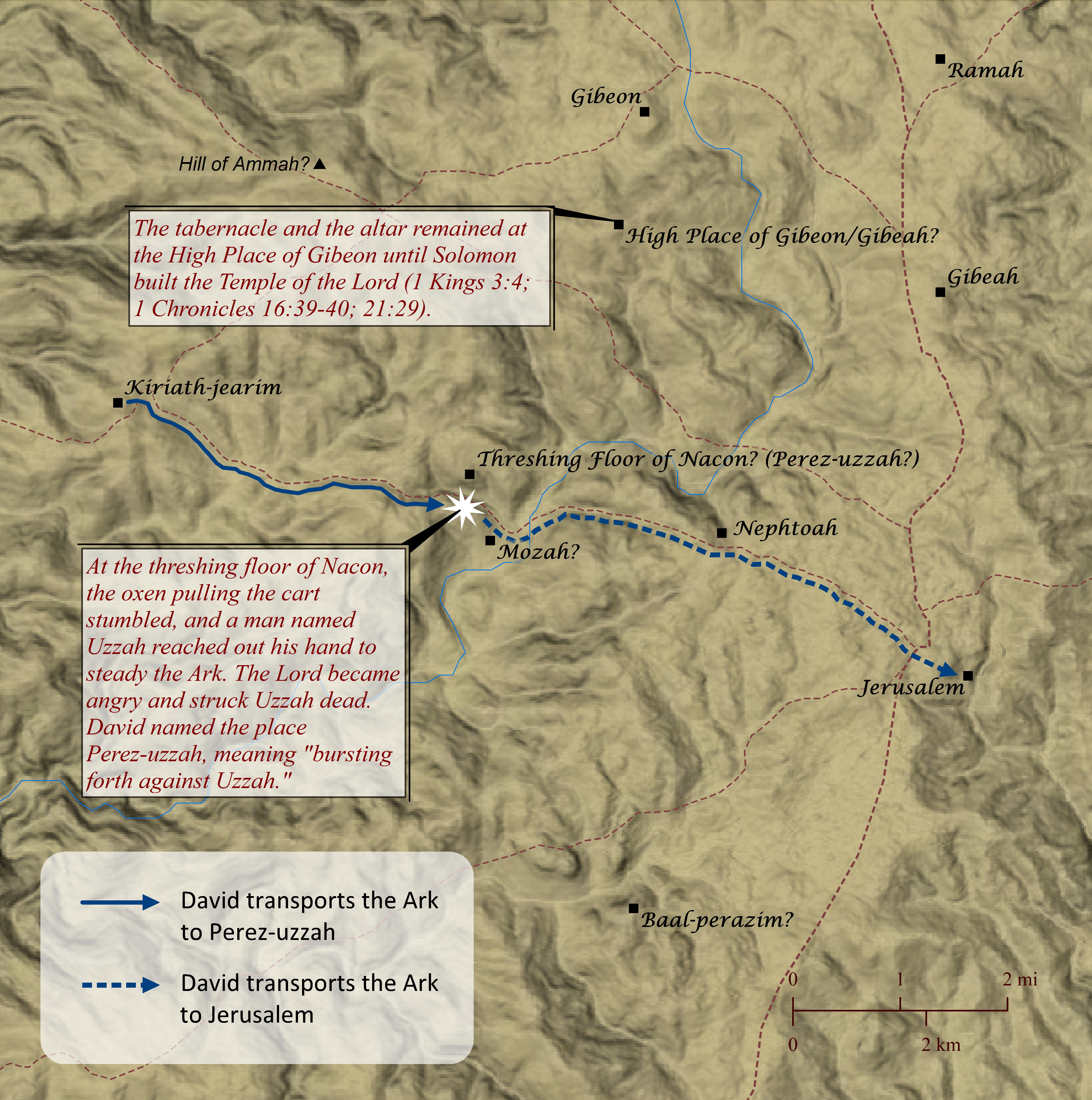Readers’ Version
Literal Version
13 One day David consulted with all his leaders—the commanders of thousands and of hundreds. 2 David said to all the assembly of Yisrael, “If it sounds good to you all, and to our god Yahweh, let’s spread out to all our different regions to recruit our relatives, along with the priests and the Levites in the cities of their pasturelands, so they can join us. 3 And let’s return our god’s box back here, because we didn’t use it to ask God for guidance in Shaul’s time.” 4 All the assembled people agreed because everyone could see that it was the right thing to do.
5 So David assembled all Yisrael from Shihor river down in Egypt and as far north as Lebo-Hamat, to bring in God’s chest from Kiriat-Yearim.[ref] 6 Then David and all Yisrael went to Kiriat-Yearim (also known as Baalah, in Yehudah), to bring up from there the box of God Yahweh who sits over the winged creatures. The box is used when calling his name to request help.[ref] 7 They transported God’s box on a new cart from Avinadav’s house, and Uzzah and Ahyo were leading the cart 8 and David and all Yisrael were celebrating in front of God with all their energy, and with songs, and with lyres, harps, tambourines, cymbals, and trumpets.
9 However just as they were passing Kidon’s threshing floor, the oxen stumbled and Uzzah reached out to steady the box. 10 That made Yahweh very angry with Uzzah, and he struck him down because he had reached out to touch the box, and he died right there in front of God. 11 That in turn made David angry because Yahweh had burst out against Uzzah, and he named that place Perets-Uzzah (which means ‘outburst against Uzzah’) until this day.
12 David was afraid of God that day and asked himself, “How can I possible bring God’s box to where I am in Yerushalem?” 13 So David gave up on bringing the box to where he was in the city of David, and instead he took it into the nearby house of Oved-Edom the Gittite. 14 So God’s box stayed at Oved-Edom’s house for three months, and Yahweh blessed Oved-Edom’s home and everything that belonged to him.[ref]
2 And_ Dāvid _he/it_said to_all/each/any/every the_assembly_of Yisrāʼēl/(Israel) if to_you(pl) good and_from YHWH god_of_our let_us_spread_out let_us_send to brothers_of_our the_remain in/on/at/with_all_of the_lands_of Yisrāʼēl/(Israel) and_with_them the_priests and_the_Lēviyyiy in/on/at/with_cities_of pasturelands_of_their and_gathered to_us.
3 And_bring_back DOM the_box_of god_of_our to_us if/because not seek_it in/on/at/with_days_of Shāʼūl/(Saul).
4 And_ all_of _they_said the_assembly for_doing thus if/because it_was_pleasing the_thing in/on_both_eyes_of all_of the_people.
5 And_ Dāvid _assembled DOM all_of Yisrāʼēl/(Israel) from Shiyḩōr of_Miʦrayim/(Egypt) and_unto Ləⱱōʼ Ḩₐmāt to_bring DOM the_box_of the_ʼElohīm from_Qiryat- yəˊārīm/(jearim).
6 And_ Dāvid _he/it_ascended and_all Yisrāʼēl/(Israel) Baˊₐlāh_to to Qiryat Yəˊārīm/(Jearim) which belongs_to_Yəhūdāh/(Judah) to_bring_up from_there DOM the_box_of the_ʼElohīm YHWH who_sits the_cherubim which a_name it_is_called.
7 And_carried DOM the_box_of the_ʼElohīm on a_cart new from_house_of ʼAⱱīnādāⱱ and_ˊUzzāʼ and_ʼAḩyō were_leading in/on/at/with_cart.
8 And_Dāvid and_all Yisrāʼēl/(Israel) were_playing to_(the)_face_of/in_front_of/before the_ʼElohīm in_all strength and_in/on/at/with_songs and_in/on/at/with_lyres and_in/on/at/with_harps and_in/on/at/with_tambourines and_in/on/at/with_cymbals and_in/on/at/with_trumpets.
9 And_they_came to the_threshing_floor_of Kīdōn and_ ˊUzzāʼ _put_out DOM his/its_hand to_hold DOM the_box if/because they_had_stumbled the_oxen.
10 And_it_glowed/burned the_anger of_YHWH in/on/at/with_ˊUzzāʼ and_struck_down_him on that he_had_stretched_out his/its_hand on the_box and_he/it_died there to_(the)_face_of/in_front_of/before god.
11 And_it_glowed/burned to_Dāvid if/because YHWH he_had_broken_out a_breaking_out in/on/at/with_ˊUzzāʼ and_he/it_called to_the_place (the)_that Pereʦ ˊUzzāʼ until the_day the_this.
12 And_ Dāvid _afraid DOM the_ʼElohīm in_the_day (the)_that to_say how will_I_bring to_me DOM the_box_of the_ʼElohīm.
13 And_not Dāvid he_turned_aside DOM the_box to_him/it to the_city_of Dāvid and_took_aside_it to the_house_of ˊŌⱱēd- ʼEdōm the_Gittiy.
14 And_ the_box_of _he/it_sat_down//remained//lived the_ʼElohīm with the_household_of ˊŌⱱēd- ʼEdōm in/on/at/with_house_of_his three months and_ YHWH _he/it_blessed DOM the_household_of ˊŌⱱēd- ʼEdōm and_DOM all_of that to_him/it.

